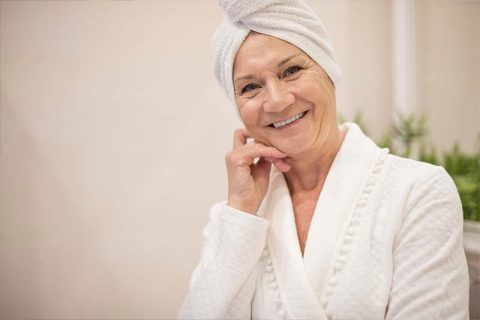April 11, 2023 by

Starting the day with a rejuvenating shower and ending it with a warm bubble bath are daily pleasures for many of us. But it really is possible to have too much of a good thing when it comes to bathing habits for older adults. You might want to rethink that daily bath or shower for seniors, for several reasons:
- The risk of skin infections from dry, cracked skin
- Thinner skin which can lead to easier bruising and other injuries
- Mobility issues
- An increased risk of falls on slippery floors
- Fatigue
- And more
Wondering How Often a Senior Should Bathe?
It only takes a couple of baths or showers per week to maintain personal hygiene for older adults. In between, a warm washcloth can be used to clean areas that require additional attention. This is especially important for older adults who wear products to manage incontinence.
What if the Aging Adult Has Dementia?
Dementia adds extra considerations when deciding how often a senior should bathe. One exception to consider is a senior with dementia. Because routine is so important when cognitive issues are a factor, a daily bath or shower can be a source of comfort. If a senior with dementia is fearful or otherwise resists personal hygiene however, try the following:
- Talk through each step. Explain what is going to happen in simple terms and in a soothing tone of voice before each part of the bathing process.
- Focus on comfort. Keep the bathroom warm. Turn on music they enjoy. Have plenty of big, soft towels on hand. Use shampoo and soap or body wash in a calming, pleasant scent.
- Promote independence. Empower the senior to remain in control of the bathing process as much as possible. Encourage them to participate according to their ability level, even if that means just holding onto the washcloth or shampoo bottle.
- Ease fears. The loud, pounding sound of a shower or bathwater running is terrifying for some older adults with dementia. A handheld shower set at a minimal level is quieter and allows the person to see where the water is coming from.
- Create a positive association. Incorporate an especially enjoyable activity at the end of the bath-time routine. For instance, provide a favorite snack that is only served after bathing so it creates a positive connection.
It’s not uncommon for aging loved ones to prefer help with personal hygiene needs from a professional caregiver. At Home Independent Living’s care team is fully trained and experienced in providing support for safe, comfortable baths or showers. Our focus is always on ensuring dignity and respect and addressing any particular fears or concerns with skill and empathy. Call us at (315) 579-HOME (4663) to find out more.
